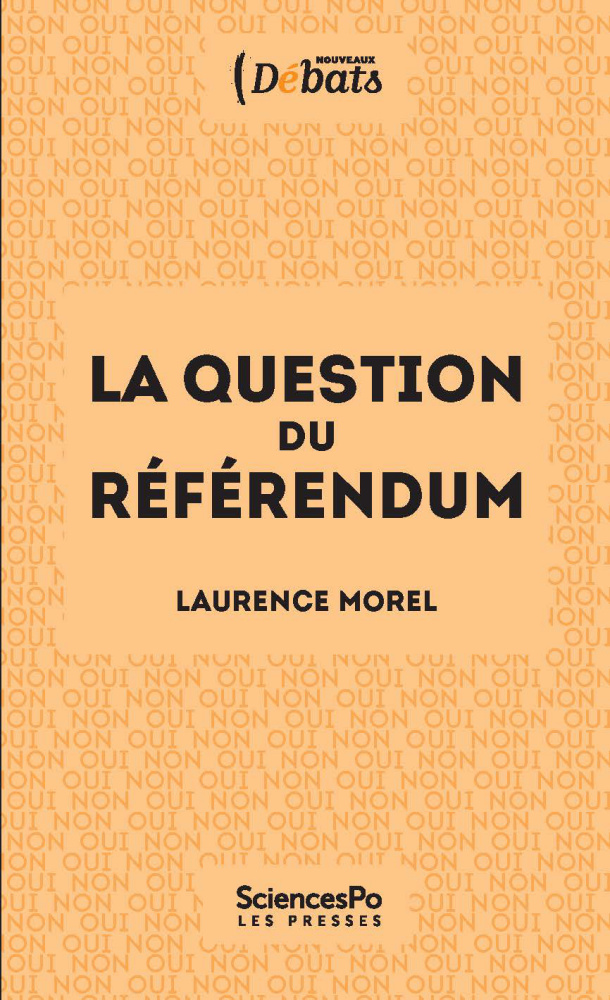La question du référendum
First Edition
The referendum is a political tool that provokes deep distrust among elites. Yet if it is well designed, a referendum can accompany certain major political decisions, help to create a relationship of trust between citizens and institutions, and may also play a central role in the experimental forms of particularity at the local levels. Read More
Often criticized, particularly in France, the referendum is a political tool that provokes deep distrust among elites. It is accused of being the negation of democracy masquerading as the real thing. It is said that although it claims to resolve crises through popular legitimacy, most often it actually aggravates those crises. As the incarnation of majority rule, it is also seen as suffering more than representative democracy from a minority bias.
Indeed, although it is simple – even simplistic (asking for a yes or no answer) – a referendum is a complex institution that is heavily conditioned by the modalities of its organization (wording of the question, campaign rules, existence or not of participation quotas, qualified majorities, jurisdictional oversight etc.). There no one referendum but rather a myriad of types of referenda, all liable to lead to very different, or even diametrically opposed, results.
Yet if it is well designed, a referendum can accompany certain major political decisions and help to create a relationship of trust between citizens and institutions. It may also play a central role in the experimental forms of participative democracy underway at the national and particularly at the local levels.
Specifications
- Publisher
- Presses de Sciences Po
- Author
- Laurence Morel,
- Collection
- Nouveaux Débats
- Language
- French
- Publisher Category
- > Political Science > French Politics
- Publisher Category
- > Political Science > Political Life
- Publisher Category
- > Fields > Political science
- Publisher Category
- > Political Science
- Publisher Category
- > Politics
- Publisher Category
- > Society
- BISAC Subject Heading
- POL000000 POLITICAL SCIENCE
- BIC subject category (UK)
- J Society & social sciences > JP Politics & government
- Title First Published
- 28 November 2019
- ONIX Adult Audience Rating
- Any adult audience
- Type of Work
- Monograph
Paperback
- Product Detail
- 1
- Publication Date
- 28 November 2019
- ISBN-13
- 9782724623154
- Product Content
- Text (eye-readable)
- Extent
- Front matter page count (Roman) : 308
- Code
- 9782724623154
- Dimensions
- 11 x 18 cm
- Weight
- 350 grams
- ONIX XML
- Version 2.1, Version 3
ePub
- Product Detail
- 1
- Publication Date
- 28 November 2019
- ISBN-13
- 9782724623178
- Product Content
- Text (eye-readable)
- Extent
- Front matter page count (Roman) : 311
- Code
- 9782724623178
- Technical Protection ebook
- Adobe DRM
- ONIX XML
- Version 2.1, Version 3
Google Book Preview
Contents
Introduction – L'impensé référendaire
Chapitre 1 – Définitions
Qu'est-ce qu’un référendum ?
Diversité des référendums
Chapitre 2 – Aperçu comparatif
L’institutionnalisation croissante
L’augmentation de la pratique
Profils d’utilisateur
Profils nationaux en Europe
La spécificité française en Europe
Théories « micro » et « macro » de la diffusion du référendum
Chapitre 3 – Histoires référendaires croisées
Le trio initial : États-Unis, France, Suisse
Brève « histoire longue » hexagonale depuis la Révolution
Chapitre 4 – Le référendum gaullien
Les référendums constitutionnels de la Libération
Les dispositifs dans le texte de 1958
Le référendum au coeur de la mécanique gaullienne
La perte de fonctionnalité du procédé après 1962
La marginalisation ultérieure avec le quinquennat
Chapitre 5 – Le « retour du refoulé »
2005 : la société civile s’empare du référendum
Une réponse institutionnelle ambiguë
Promesses de campagne
Chapitre 6 – Référendum et crise de la représentation
Radiographie de la demande de démocratie directe
Une réponse à la crise
Chapitre 7 – Le référendum, mal-aimé de la théorie démocratique
Élitistes et participationnistes
Théories de l’innovation démocratique
Chapitre 8 – Référendum et volonté populaire
L’impossible volonté majoritaire
L’impossible volonté populaire
Chapitre 9 – Politiques référendaires et effets politiques des référendums
Décisions référendaires : intérêt général, minorités, droits, compromis
Effets politiques des référendums
Conclusion – Le référendum : pourquoi et comment ?
Documents
Bibliographie
Table des tableaux, documents et annexes

